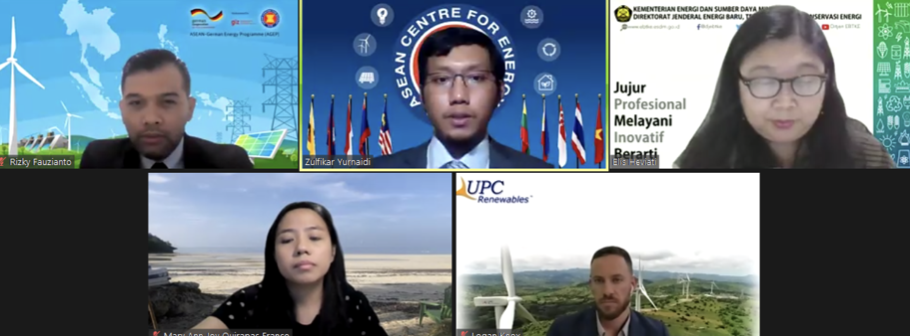Menu
Online, 23 June 2021As an effort in achieving SDG7: “Ensuring access to affordable, reliable, sustainable and modern energy for all” in ASEAN, ASEAN Centre for Energy (ACE) held a virtual webinar on 23 June 2021 to discuss efforts in escalating the progress and tackling the challenges of rapidly evolving energy markets. It is an official side event of the United Nation’s High-Level Dialogue on Energy: Ministerial-level Thematic Forums. The discussion focuses on how to enhance the robustness of energy policy and plan to reduce investment risks. Therefore, ASEAN can be a sustainable, equitable, and resilient energy community in reaching the SDG7 by 2030.

Opening remarks were delivered by the manager of the ASEAN Climate Change and Energy Project (ACCEPT), Mr Beni Suryadi. The webinar was moderated by a senior research analyst of ACCEPT, Dr Zulfikar Yurnaidi. The panellists were Ms Elis Heviati, S.T., Coordinator of Investment and Cooperation in Bioenergy, Ministry of Energy and Mineral Resources of Indonesia; Dr Mary Ann Quirapas-Franco, Research Fellow of Energy Studies Institute; Mr Logan Knox, Director and CEO of UPC Renewables Vietnam; and Mr Rizky Fauzianto, Team Leader of ASEAN German Energy Programme of GIZ.
With the SDG 7 progress in the region, 5 ASEAN Member States (AMS) have reached 100% electrification while 138.7 million ASEAN people still use traditional biomass for cooking. Substantial increase in energy demand will be met by renewable energy (RE), and as of 2017, ASEAN had surpassed the 2020 regional target of achieving 21.6% energy intensity reduction. To escalate SDG 7 progress, socio-economic approaches, key stakeholder’s involvement, breaking the silos between sectors, and synchronising with COVID-19 recovery are needed.
Ms Elis emphasised the importance of bioenergy role in RE and the implementation in Indonesia, whereas of now, Indonesia has achieved B30 mandate in the transportation sector. However, many people in Indonesia still depend on traditional biomass for cooking. The government of Indonesia have been working hard to achieve the SDGs. Indonesia has not yet reached the 100% electrification target, and the rate was only 90.2% in 2020. RE will take an important role in supply energy demand in areas with no access to electricity, especially in remote and distant parts of Indonesia. The RE program includes indigenous sources such as communal solar PV, mini power hydro, and mini biomass powerplant. To reduce imported Liquid Petroleum Gas (LPG) consumption, there will be a gas network expansion of up to 4 million new connections in 2024. The government will offer private parties to get involved through the public-private partnership scheme to boost the investment.
Dr Mary pointed out that the main challenge for rural electrification is more than to survive everyday lives but to see electricity as an enabler to achieve sustainable development. Long term energy access of a community, energy resilience for the disaster-prone area, sustainable energy for socio-economic activities, and community-based RE projects need to be considered. Dr Mary then highlighted three issues:
Mr Logan explained that the private sector like UPC Renewables has been able to do quite a lot in ASEAN from the past 5-7 years. RE projects in ASEAN has increased significantly. For example, in 2016, Vietnam had only around 100 MW of solar power, and now there are between 15,000-20,000 MW. Green energy has grown dramatically over the last decade and became commercially attractive. To achieve our goal for the next nine years under SDG 7, probably there will be several trends that will help us, including cheaper storage. The private sector can contribute essentially as long as they are given a proper framework for achievements and clear regulatory standards.
Mr Rizky described that GIZ has a particular focus on the achievement of SDG7, in conjunction with other SDGs, through several projects, such as those of clean energy topic in the region. For several years, the project has been proven crucial to address the gap in regulatory frameworks and strengthen investment and cooperation of all the stakeholders, such as the government, private sector, academia, and international organisation.

Dr Zulfikar then led the panellists to the Q&A session. Ms Elis described that to fulfil electrification and RE target, and the Indonesian government will use local RE potential to be more efficient, effective, and affordable. The use of local RE potential will involve social engagement that will increase their sense of project ownership. Innovation in clean cooking and incentive and disincentive mechanism will be crucial. Dr Mary explained that RE project implementation in rural areas needs continuous engagement to be a successful intervention. For example, in the Philippines, the local community’s organisation and NGOs need to be more institutionalised in rural electrification. Mr Rizky mentioned that clean energy projects in Southeast Asia are growing. Challenges in matching between the donors and the recipients are there on the technical side, but they are pretty manageable in the higher perspective. Mr Logan shared the case of Vietnam and pointed out that it is crucial to maintain sustainable growth of renewable energy penetration and avoid a boom-and-bust cycle in some markets in Asia.
Mr Beni wrapped up the session with closing remarks by quoting Mr Logan on the importance of continuous effort and collaboration. This is the following ACE, especially in ACCEPT, and is still implementing several studies and collaborative efforts to achieve SDG 7. He also promoted the ASEAN Researchers Network on Energy and Climate Change (ARNECC) as a collaboration platform, especially with academe and research institutions.
